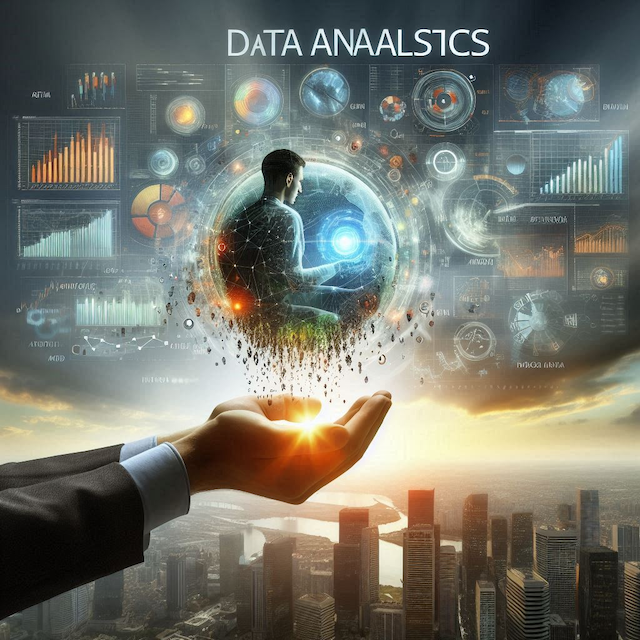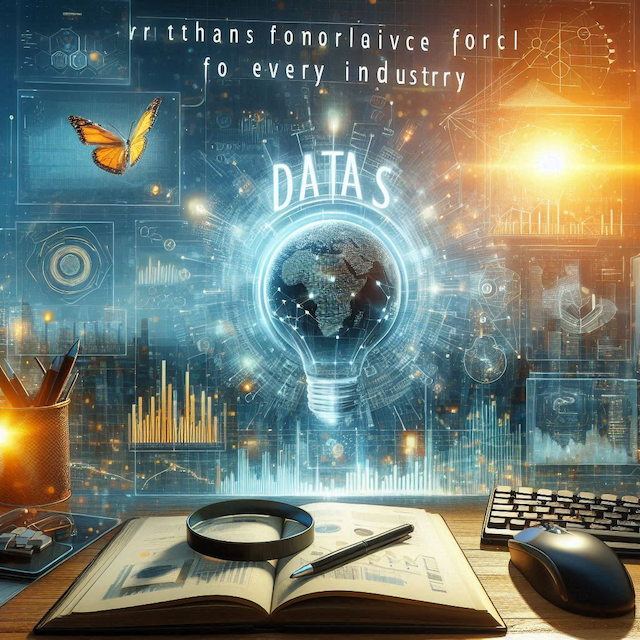Table of Contents
- Introduction
- The Evolution of Business Intelligence
- Understanding Data-Driven Decision Making
- Key Components of Effective Analytics Strategies
- Industry-Specific Applications of Data Analytics
- Building a Data-Centric Organization
- Overcoming Challenges in Analytics Implementation
- The Future of Business Analytics
- Case Study: Marriott International’s Analytics Success
- Conclusion
- FAQ
Introduction
Imagine you’re playing a game of chess, but instead of relying on your intuition, you have a supercomputer analyzing every possible move and its consequences. That’s essentially what data analytics is doing for businesses today. It’s not just about having more information; it’s about having the right information at the right time to make game-changing decisions.
In this article, we’re going to explore how data analytics is reshaping industries across the board. From retail to healthcare, from finance to manufacturing, we’ll see how companies are leveraging the power of data to gain a competitive edge. So, whether you’re a business owner looking to up your game or just someone curious about the forces shaping our modern economy, buckle up! We’re about to take a deep dive into the world of data analytics.
The Evolution of Business Intelligence
From Gut Feelings to Data-Driven Insights
Remember the days when business decisions were made based on hunches and experience alone? While there’s still value in intuition, today’s business landscape demands a more scientific approach. Enter business intelligence (BI) and its evolution into modern data analytics.
The BI Timeline: A Journey Through Data
| Era | Focus | Key Technologies |
|---|---|---|
| 1960s-1970s | Data Collection | Mainframe computers, databases |
| 1980s-1990s | Data Warehousing | Relational databases, data marts |
| 2000s | Business Intelligence | OLAP, dashboards, scorecards |
| 2010s-Present | Advanced Analytics | Big data, machine learning, AI |
The Rise of Big Data
The term “big data” has been buzzing around for a while now, but what does it really mean? Simply put, it refers to the explosion of available data thanks to digital technologies. We’re talking about:
- Social media posts
- Website clicks
- IoT sensor data
- Customer transactions
- And so much more!
This abundance of data has created both challenges and opportunities. The challenge? Making sense of it all. The opportunity? Gaining insights that were previously unimaginable.

Understanding Data-Driven Decision Making
What is Data-Driven Decision Making?
Data-driven decision making (DDDM) is exactly what it sounds like: using data to inform your choices. But it’s not just about having data; it’s about having the right data and knowing how to interpret it.
The DDDM Process
- Define the Question: What problem are you trying to solve?
- Collect Relevant Data: Gather information that relates to your question.
- Analyze the Data: Use statistical tools and techniques to find patterns and insights.
- Interpret the Results: What do these patterns mean for your business?
- Make the Decision: Based on the insights, choose the best course of action.
- Monitor and Adjust: Track the results and refine your approach as needed.
Benefits of Data-Driven Decision Making
- Increased objectivity
- Better risk management
- Improved operational efficiency
- Enhanced customer understanding
- More accurate forecasting
Key Components of Effective Analytics Strategies
1. Data Quality Management
Garbage in, garbage out, as they say. Ensuring the quality of your data is crucial. This involves:
- Data cleansing
- Removing duplicates
- Standardizing formats
- Validating accuracy
2. Advanced Analytics Tools
From descriptive to predictive and prescriptive analytics, having the right tools is essential. Some popular options include:
- Tableau
- Power BI
- SAS
- R and Python for custom solutions
3. Skilled Analytics Team
Data doesn’t interpret itself. You need people who can turn numbers into narratives. Key roles include:
- Data Scientists
- Business Analysts
- Data Engineers
- Analytics Managers
4. Data Governance
With great data comes great responsibility. Proper data governance ensures:
- Data security
- Privacy compliance
- Ethical use of information
5. Integration with Business Processes
Analytics shouldn’t be a siloed department. It should be integrated into every aspect of your business operations.

Industry-Specific Applications of Data Analytics
Retail: Personalization and Inventory Management
Retailers are using analytics to:
- Predict trends
- Optimize pricing
- Personalize marketing
- Manage inventory efficiently
For example, Target famously used analytics to predict which customers were pregnant, allowing them to target marketing efforts effectively.
Healthcare: Improving Patient Outcomes
In healthcare, analytics is being used for:
- Predictive diagnostics
- Treatment optimization
- Resource allocation
- Fraud detection
One exciting application is the use of machine learning to analyze medical images, potentially detecting diseases earlier than human doctors.
Finance: Risk Management and Fraud Detection
Banks and financial institutions leverage analytics for:
- Credit scoring
- Market analysis
- Algorithmic trading
- Anti-money laundering efforts
Manufacturing: Predictive Maintenance and Quality Control
Manufacturers are using data to:
- Predict equipment failures
- Optimize supply chains
- Improve product quality
- Reduce downtime
Transportation: Route Optimization and Safety
In transportation and logistics, analytics helps with:
- Route planning
- Fleet management
- Predictive maintenance
- Safety improvements
Building a Data-Centric Organization
1. Cultivate a Data-Driven Culture
It’s not enough to have the tools; you need a culture that values data. This means:
- Encouraging data literacy across all levels
- Rewarding data-driven decision making
- Promoting transparency in data sharing
2. Invest in Training and Development
As analytics tools evolve, so should your team’s skills. Continuous learning is key.
3. Start with High-Impact Projects
Begin your analytics journey with projects that can demonstrate clear value. This builds momentum and buy-in across the organization.
4. Establish Clear Metrics and KPIs
What gets measured gets managed. Establish clear metrics to track the success of your analytics initiatives.
5. Foster Cross-Functional Collaboration
Analytics shouldn’t be isolated to a single department. Encourage collaboration between data teams and other business units.

Overcoming Challenges in Analytics Implementation
1. Data Silos
Challenge: Information trapped in different departments or systems.
Solution: Implement data integration strategies and promote a culture of data sharing.
2. Skill Gaps
Challenge: Shortage of qualified data professionals.
Solution: Invest in training programs and consider partnerships with universities or analytics firms.
3. Resistance to Change
Challenge: Employees reluctant to adopt new data-driven processes.
Solution: Demonstrate the value of analytics through pilot projects and provide comprehensive training.
4. Data Privacy and Security Concerns
Challenge: Ensuring compliance with regulations like GDPR.
Solution: Implement robust data governance policies and invest in secure analytics platforms.
5. Scalability Issues
Challenge: Analytics solutions that can’t keep up with growing data volumes.
Solution: Invest in cloud-based analytics platforms that can scale with your needs.
The Future of Business Analytics
Artificial Intelligence and Machine Learning
AI and ML are taking analytics to new heights, enabling:
- Automated pattern recognition
- Natural language processing for data querying
- Predictive and prescriptive analytics at scale
Real-Time Analytics
The ability to analyze data as it’s generated allows for:
- Instant decision-making
- Dynamic pricing strategies
- Immediate response to market changes
Edge Analytics
Processing data closer to its source (e.g., IoT devices) offers:
- Reduced latency
- Lower data transmission costs
- Enhanced privacy and security
Augmented Analytics
This emerging field combines AI and ML to automate:
- Data preparation
- Insight discovery
- Insight sharing
Data Democratization
Making data and analytics tools accessible to non-technical users:
- Empowers employees at all levels
- Speeds up decision-making processes
- Fosters a data-driven culture across the organization
Case Study: Marriott International’s Analytics Success
Marriott International stands out as a prime example of an analytics competitor. Over the past two decades, they’ve transformed their business through the power of data:
Revenue Management Revolution
- Developed a sophisticated system for optimal pricing of guest rooms
- Expanded analytics to conference facilities and catering services
- Created online tools for property managers and hotel owners
Total Hotel Optimization Program
This initiative applies quantitative analysis to various aspects of hotel operations, including:
- Inventory management
- Customer segmentation
- Marketing campaign effectiveness
- Staff scheduling
Revenue Opportunity Model
Marriott’s innovative approach compares actual revenues to optimal potential rates, allowing for continuous improvement and maximization of profits.
Results
- Increased revenue per available room
- Improved customer satisfaction scores
- More efficient resource allocation
- Enhanced ability to predict and respond to market trends

Conclusion
As we’ve seen, data analytics is not just a trend; it’s a fundamental shift in how businesses operate and compete. From retail to healthcare, from finance to manufacturing, organizations across industries are leveraging the power of data to make smarter decisions, optimize operations, and create value for their customers.The journey to becoming a data-centric organization isn’t always easy. It requires investment in technology, skills, and cultural change. But as companies like Marriott International have shown, the rewards can be tremendous.
As we look to the future, the role of analytics in business strategy will only grow more critical. Emerging technologies like AI, machine learning, and edge computing are opening up new possibilities for how we collect, analyze, and act on data.The question is no longer whether your organization should embrace data analytics, but how quickly you can do so. In this data-driven world, the ability to turn information into insight and insight into action may well be the defining competitive advantage of our time.So, are you ready to harness the power of data? The future is here, and it’s driven by analytics.
FAQ
Q1: What is data analytics?
A1: Data analytics is the process of examining large sets of data to uncover hidden patterns, correlations, and other insights. It involves various techniques and tools to turn raw data into actionable business intelligence.
Q2: How is data analytics different from traditional business intelligence?
A2: While traditional business intelligence focuses on descriptive analytics (what happened), modern data analytics also includes predictive (what will happen) and prescriptive (what should we do) analytics. It often involves more advanced techniques like machine learning and real-time processing.
Q3: Do I need to be a large corporation to benefit from data analytics?
A3: Not at all! While large corporations often have more resources to invest in analytics, businesses of all sizes can benefit from data-driven decision making. There are many affordable and scalable analytics solutions available for small and medium-sized businesses.
Q4: What skills are needed to implement data analytics in my organization?
A4: Key skills include data analysis, statistical knowledge, programming (especially in languages like Python or R), database management, and data visualization. Soft skills like critical thinking and communication are also crucial for translating data insights into business actions.
Q5: How can I start implementing data analytics in my organization?
A5: Start by identifying a specific business problem you want to solve. Then, assess your current data capabilities and identify any gaps. Begin with a small, high-impact project to demonstrate value. As you see results, you can expand your analytics initiatives across the organization.
